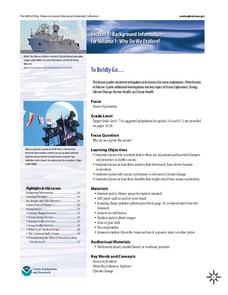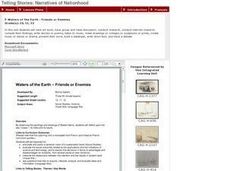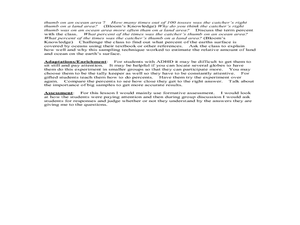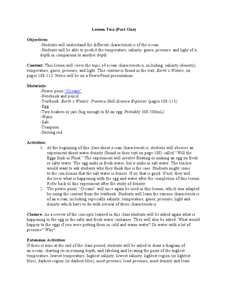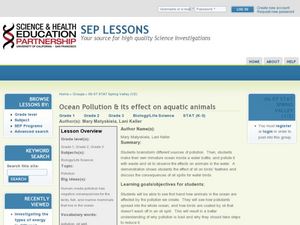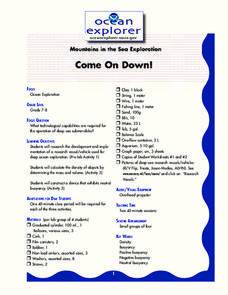Polar Trec
Where in the World Is Our Teacher?
Kirk Beckendorf, a middle school teacher, joined researchers at the McMurdo Station in Antarctica to help maintain automatic weather stations. The lesson encourages pupils to track his travels around the region. They connect with the...
California Academy of Science
Tropical Belt
Where in the world is the equator? Explore a world map with your class, coloring in oceans, continents, and rainforests while locating the three major lines of latitude: the equator, Tropic of Cancer, and Tropic of Capricorn. Discuss how...
Berkshire Museum
Where’s the Water?: Acting Out Science Cycles
Young scientists transform themselves into rivers, oceans, clouds, and drops of water in order to explore the water cycle. After assigning and explaining to students their different roles in the activity, the teacher reads aloud a...
PHET
Planet Designer: Retro Planet Red
What does the atmosphere on Mars look like? This fourth instructional activity in the series of five is designed for high schoolers. Scholars apply previous knowledge to add atmosphere to Mars in an online simulation. This comprehensive...
NOAA
To Boldly Go...
When we think of ocean exploration, many of us have visions of sunken pirate ships full of treasure or mysterious creatures of the deep. What really motivates deep-sea investigation? The first in a series of diverse six-part lessons...
Curated OER
Waters of the Earth - Friends or Enemies
High Schoolers observe the paintings and drawings of Robert Harris, and do a study of the ocean that delves into human and physical geography. Learners make prints, listen to music, create a database, and perform research on a specific...
Curated OER
Seas, Gulfs and Bays
Students define gulf, bay, and sea. In this bodies of water mapping instructional activity, students locate seas, gulfs and bays and explain how they knew which body of water it was.
Curated OER
A Sea-nic Perspective
Students brainstorm topics related to the health of our world's oceans. They create presentations about specific issues affecting oceans for display in a classroom exhibit. They write letters of invitation to guests to view the exhibit.
Curated OER
Island Survival
Students participate in a simulation of life on a deserted island. They apply their critical thinking skills and knowledge of oceans and islands to "survive" and ultimately return to safety. Lesson contains adaptations for all levels.
Curated OER
Voyage to Kure Viewing Guide
Students complete a worksheet while viewing a video about the oceans. They locate the oceans on a map and identify positive and negative ways in which humans have impacted them. They discuss any questions at the end of the lesson.
Curated OER
Remote Sensing
Students research the Earth's ocean systems. They examine the impact of global warming on the oceans and the world as a whole.
Curated OER
Journey To the Unkown
Learners explore the ocean rift habitat off the Galapagos through an audio expedition, Internet research on deep sea animals, an explorer game and simulation of the exploration of the deep sea bottom. They focus on the actual NOAA...
Curated OER
Melted Oceans Lesson Plan
Students use melted crayons to mix and blend into ocean in motion scenes. They choose colors that they see in ocean water, melt the crayons, and swirl the wax into designs on white construction paper. They finish the artwork by letting...
Curated OER
Oceans and Weather
Students analyze the impact the ocean and its currents have on weather. In this oceans and weather lesson, students analyze data comparing inland and coastal weather, and analyze satellite data for evidence of El Nino.
Curated OER
What Part of the Earth's Surface is Covered by Oceans?
Third graders investigate oceans. For this Earth science lesson, 3rd graders predict how much of the Earth's surface is covered by oceans. Students determine if their predictions are accurate by throwing a globe to each other and then...
Curated OER
Lesson tow
Students study the ocean and its characteristics. In this oceans lesson students complete a lab activity and are able to predict temperature of certain depths.
Curated OER
Gray Whales on the Move
Students study whale migration and their natural history. In this migration lesson plan students plot whale migration on a map and describe their ecosystems.
Curated OER
Down on the Ocean Floor
Students build a map of the Atlantic Ocean floor and mark the different depths. In this ocean floor lesson students identify parts of the ocean floor that they created and discuss patterns that they see.
Curated OER
Lesson one
Young scholars study waves and how it erodes a beach. In this energy lesson students complete a lab activity on waves and tides.
Curated OER
Ocean Pollution & its Effect on Aquatic Animals
Students consider the concept of ocean pollution. In this ocean lesson, students participate in a hands-on demonstration in order to replicate an oil spill and its effects on marine life.
Curated OER
Life on the Surface of the Earth
Students discover that life occurs on or near the surface of the Earth in land, air, and water. They read the literature selection, 'Whose Forest Is It?'
and discuss with students that there are examples of of many living things
that...
Curated OER
Come On Down!
Students research the implementation of a research vessel used for ocean exploration. In buoyancy lesson students will construct a device that shows neutral buoyancy.
American Museum of Natural History
What is Marine Biology?
A marine environment covers the majority of the earth but is arguably the least understood. Teach young scientists about the characteristics of oceans and ocean species using an interactive online lesson. The in-person or remote learning...
NOAA
Plate Tectonics II
Mid-ocean ridges, rift valleys, island arcs, mountain ranges, earthquakes, volcanoes ... there are so many features associated with plate tectonics. The 14th installment of a 23-part NOAA Enrichment in Marine sciences and Oceanography...
Other popular searches
- Math Lessons on Oceans
- Pre K Lessons on Oceans
- Prue K Lessons on Oceans
- Drama Lessons on Oceans
- Pr K Lessons on Oceans






